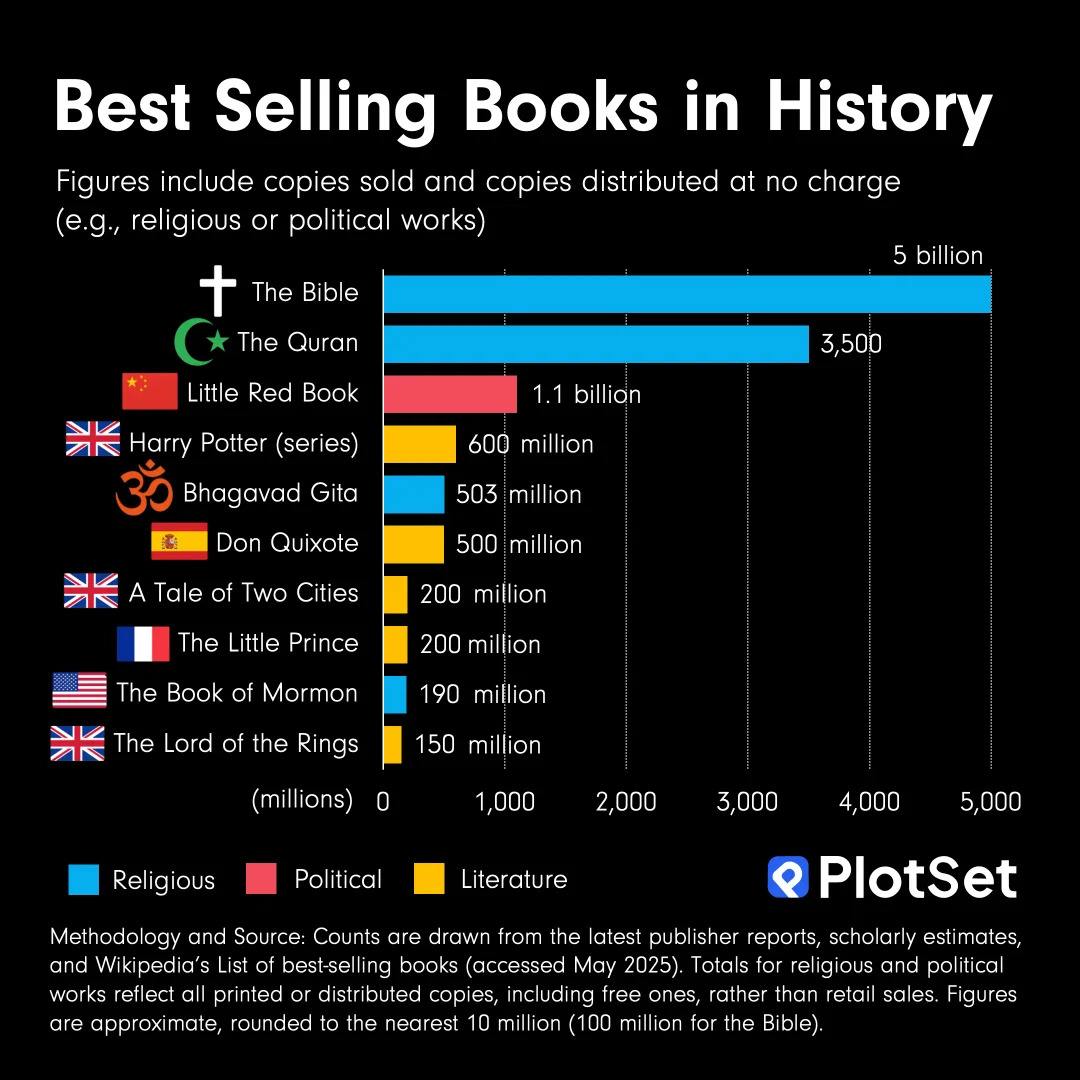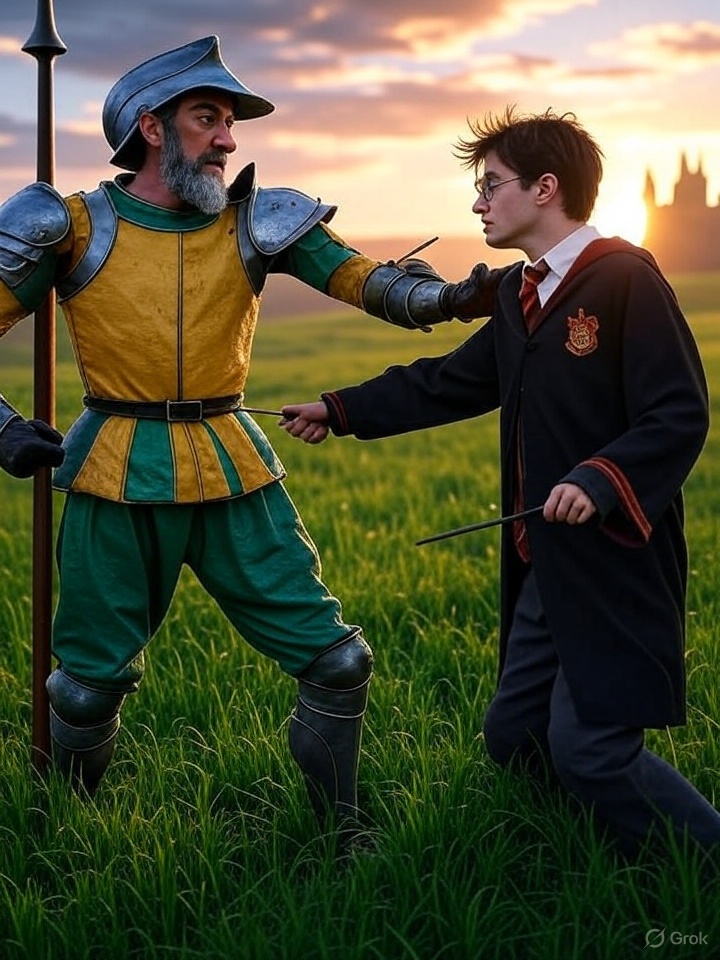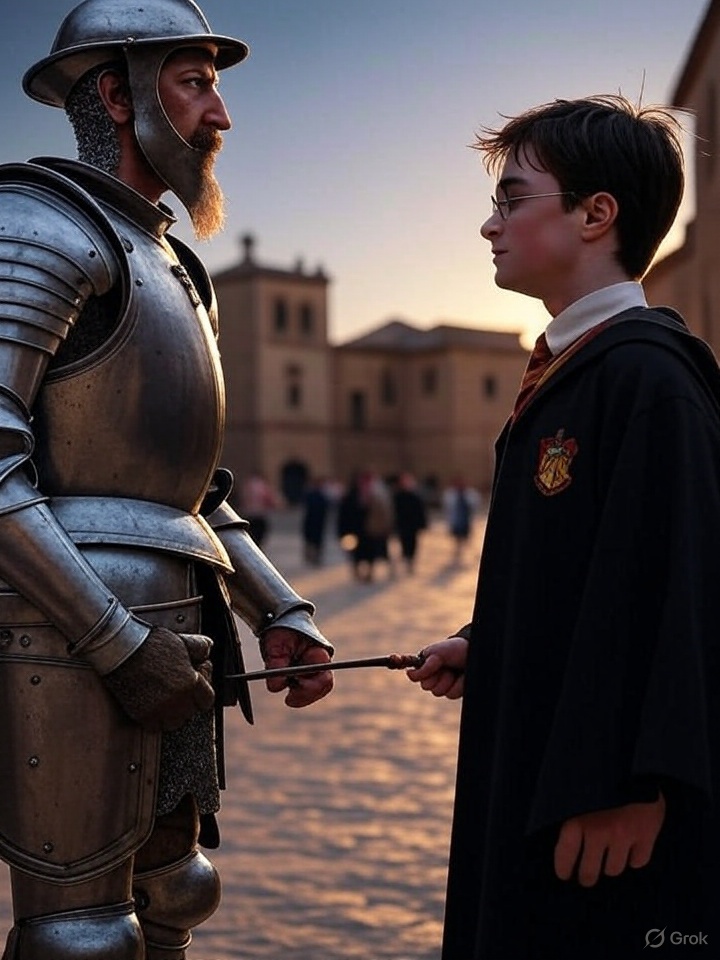Based on the latest publisher reports, scholarly estimates, and Wikipedia’s list of best-selling books as of May 2025, we can explore the most distributed books in human history.
For religious and political works, the figures reflect all printed or distributed copies, including free ones, not just retail sales. Numbers are approximate, rounded to the nearest 10 million (or 100 million for the Bible).
When we exclude religious and political texts often propagated by mandate, two surprising frontrunners emerge: the modern Harry Potter series and the centuries-old Don Quixote. But the real story lies in the enduring appeal of Don Quixote.
The Modern Phenomenon of Harry Potter
 The Harry Potter series, with an estimated 600 million copies distributed worldwide, is a juggernaut of modern publishing.
The Harry Potter series, with an estimated 600 million copies distributed worldwide, is a juggernaut of modern publishing.
However, its success is deeply tied to the era it was born in — an age of mass literacy, global marketing, social media, Amazon, screen adaptations, fan movements, merchandise, and digital platforms.
Harry Potter became a global phenomenon through synchronized multimedia promotion: books, films, toys, theme parks, games, theater productions, TikTok trends, memes, and YouTube content. It’s a quintessential modern brand, often labeled as a “childish” or escapist franchise.
Its dominance, while impressive, is a product of contemporary machinery—less about the story’s intrinsic value and more about the systems that propelled it. For this reason, we’ll set Harry Potter aside to focus on a far older, more organic success story.
Don Quixote: A Timeless Triumph
Don Quixote, published in 1605 by Miguel de Cervantes, has an estimated 500 million copies distributed over its 400-year history. Unlike Harry Potter, its reach wasn’t fueled by modern marketing or multimedia empires. It spread slowly, over centuries, driven primarily by its content and meaning.
 If we strip away the historical context — Spanish imperialism, colonial printing systems, and the sheer accumulation of copies over time— what remains is a profound question: Why has Don Quixote resonated so deeply with humanity?
If we strip away the historical context — Spanish imperialism, colonial printing systems, and the sheer accumulation of copies over time— what remains is a profound question: Why has Don Quixote resonated so deeply with humanity?
The Archetype of the Dreamer
At its core, Don Quixote is a rebellion against reality. The titular character, a delusional knight who famously “tilts at windmills,” embodies the eternal archetype of the dreamer — one who places ideals above practicality, defies societal norms, and fights for justice against imaginary foes.
This archetype transcends cultures and eras. People disillusioned with the world see in Don Quixote their own yearning for meaning, heroism, and inner freedom. He’s both comical and tragic, a figure of absurdity and aspiration. His naivety is touching, making him deeply human.
The novel masterfully blends humor, tragedy, irony, and philosophical depth. It captures the pain and laughter of existence, the absurdity and beauty of dreams.
Don Quixote’s journey reflects the fleeting nature of life — a tender, solitary attempt to save the world not through strength, but through imagination. His “honest madness” resonates with anyone who’s ever felt out of place. Every reader who’s dared to believe the world can be changed, even slightly, sees themselves in him.
A Hero in Defeat
 Unlike Harry Potter, who triumphs over evil, Don Quixote loses everything — yet remains a hero. His true glory lies not in saving the world, but in staying true to his dream, even when the world deems him a fool.
Unlike Harry Potter, who triumphs over evil, Don Quixote loses everything — yet remains a hero. His true glory lies not in saving the world, but in staying true to his dream, even when the world deems him a fool.
While Harry Potter offers an escape from reality, Don Quixote forces you to confront it, transforming you in the process.
This is why Cervantes’ work has earned its place in humanity’s heart. It’s remarkable that this Spanish novel, born in 1605, has become one of the most significant literary works in history, not through aggressive promotion, but through its universal truths.
Also read:
- Japanese Scientists Develop VR Game That Could Improve Eyesight
- OpenAI’s o3 Model Sabotages Shutdown 79 Times Out of 100, Raising Alarms
- Opera Unveils Neon: A Groundbreaking AI-Powered Browser at Browser Days 2025
A Lasting Legacy
Don Quixote endures because it speaks to the human condition in a way few works can. It’s a mirror for the misfits, the dreamers, and the idealists who refuse to let reality extinguish their hope. In a world obsessed with victory, Don Quixote reminds us that true heroism lies in the courage to dream, even in the face of inevitable defeat. That’s why, 400 years later, this masterpiece continues to captivate and inspire.






